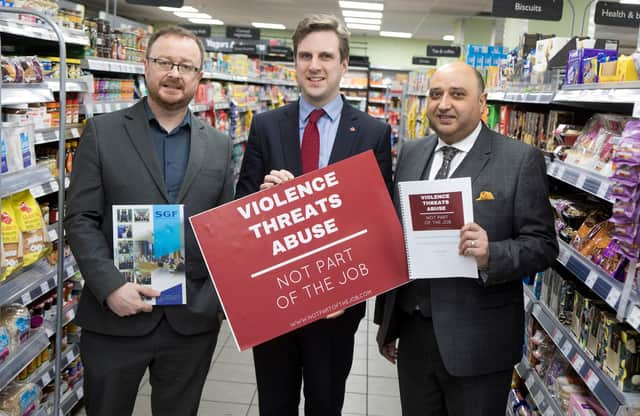New campaign encourages Scottish convenience retailers to record and report retail crime and abuse


Scottish Grocers’ Federation’s (SGF) campaign, ‘Don’t Put Up With It’, is looking to alert convenience store staff and owners in Scotland to the importance of recording and reporting instances of retail crime, abuse or violence experienced in their workplaces.
The Don’t Put Up With It campaign comes ahead of the enforcement of the Protection of Workers Act, defining the assault, abuse or threatening of retail staff as a specific offence.
Advertisement
Hide AdAdvertisement
Hide AdMohammed Rajak, known as Rajak, owns BuyWell DayToday in the east end of Glasgow, said: "I've had everything from stabbings, to attempted slashings, to break-ins and thefts. It's just another day in the life of a shopkeeper.”
Rajak, who has been in the business for 30 years, was once stabbed while closing his shop one night in the mid 90s.
“There was a crowd of youths walking by and I got attacked by them. It was more than a handful of suspects who attacked me and when I got inside, I realised that there was something wrong because my shoe was full of blood. I realised that I’d been stabbed in my leg and was taken to hospital.”
Rajak later found out that he had been attacked with a machete, yet the sole criminal responsible for the crime could not be identified and no one was charged for the act.
It is such occurrences that highlight the need for the Bill as an added layer of protection and security for retail staff, Rajak added: “The Bill needs to be widely promoted in various forms to make sure that this zero tolerance approach is actually adopted. It's not fair to shopkeepers or their workers who have to go through this every day or every week.”
Shahid Ali, known as Sid, is the Director of Nisa Local stores in Aberdeen, and has also experienced considerable theft and crime in his time as a shop owner, but explained that this has worsened during the pandemic for convenience stores like his own.
"What we're now seeing in the last year with the shops being closed is that criminals can't go into a large clothes shop and steal things, because they are all closed. The only shops that are left are food shops, but supermarkets can afford lots of staff as well as security, so small, local shops seem to be getting the brunt of it.”
"The new bill is a massive step forward,” said Dr John Lee, Head of Policy and Public Affairs at SGF. “It’s the first time we've ever had legislation that’s specifically focused on retail crime, so that in itself is a big step forward. However, for it to work retailers have got to report crimes.
Advertisement
Hide AdAdvertisement
Hide Ad“We want and need to motivate and encourage people to report crime because otherwise the scope and scale of the problem won't be understood and appreciated fully by the police or by the government.
"Unless we start seeing data coming through about the scope and scale of it, the problem will be continue to be hidden away.”
To find out more, visit https://dontputupwithit.scot/.